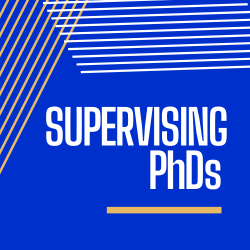This post is by Dr Ahmad Akkad Postdoctoral Researcher in the Education Department at the University of Oxford, and Dr Emily F. Henderson Reader in Gender and International Higher Education and Director of Doctoral Education and Academia Research Centre (DEAR) at the University of Warwick.

If you are a doctoral supervisor, when was the last time you received an email from a prospective student, asking if you would be willing to supervise their study? What did you do with that email, and why?
This blog post draws on a research project at the Department of Education Studies at the University of Warwick, UK, that aimed to explore the pre-application doctoral communication (PADC) stage of admissions from the perspectives of supervisors, as well as Directors of Postgraduate Research, Programme Officers and minoritized students, and also YouTube advice videos. This blog post focuses on the supervisor aspect of the study, which included a 6-week diary study tracking PADC with 19 supervisors, followed by three focus group discussions with 11 of the supervisors. Informed by equality, diversity, and inclusion (EDI) concerns around doctoral education, and inspired by the work of Julie Posselt, we wanted to explore how supervisors potentially enact gatekeeping at the informal PADC stage.
Before making formal applications, potential doctoral students frequently contact supervisors informally at different universities for potential recruitment purposes. In response, supervisors often make prompt decisions on applicants’ approaches. While the final admission decision rarely lies with thepotential supervisor (see e.g. this report on the recruitment and selection of postgraduate researchers by English higher education institutions), in choosing to reply to these applicants, supervisors effectively act as gatekeepers to doctoral education and the academic profession.
This blog post is aimed at supervisors as well as those who work with supervisors for training and development. The post brings to light the hidden, informal practices of PADC and considers avenues of reflection as well as channels of action.
What is PADC and how are supervisors involved?
PADC can include emails or drop-in visits from prospective applicants, as well as emails from or conversations with other supervisors or other members of staff, e.g. referring on emails that may be of interest. Some supervisors are inundated with PADC, and others receive relatively few, and this may vary according to discipline, career stage and popularity of research area.
The PADCstage of doctoral admissions lies outside of formal institutional processes and is therefore relatively unregulated. Because of the many emails circulating from prospective doctoral applicants, supervisors often make quick judgements about applicants based on indicative cues and personal judgement. There are concerns about balancing equality, diversity and inclusion within doctoral programmes against the workload for academics who receive these communications.
Supervisors take different actions in responding to those applicants. They may request a proposal or arrange for an informal meeting, for instance. They also provide feedback on proposals. They may, however, delay their response, or decline interest in proceeding further with potential applicants, or they pass applicants’ communications to other colleagues for consideration.
How do supervisors decide what to do with PADC?
Few supervisors would be able to articulate a personal strategy for dealing with PADC, but it was clear from our study that there are many habits of practice that supervisors engage in when they receive PADC. Many of these habits include affective responses, such as irritation or guilt as well as excitement. There are also some formal practices they are obliged to follow by their departments/institutions, which prioritise transparency and efficiency, such as using official template emails.
Some clear patterns emerged from our research – do these patterns seem familiar to you?
- For instance, supervisors aim to establish mutual expectations by assessing a candidate’s ‘fit’ with their research agenda and mentoring style, looking at academic qualifications, research experience, and relevant skills. A lack of fit can produce an instant ‘clang’ and lead to an immediate ‘no’.
- Funding and resource availability also play a significant role, leading supervisors to prioritise applicants aligned with specific scholarship opportunities or who already have obtained funding (from reputable sources…).
- Furthermore, supervisors’ mentoring philosophies may influence their decisions, with some providing hands-on guidance and others considering that proof of applicant autonomy is needed for consideration at the doctoral stage.
- Dealing with a high volume of applications presents challenges, and supervisors employ screening techniques to manage the process effectively, prioritising, for example, well-crafted emails and research proposals.
Our study found that hidden assumptions influence supervisors’ decisions about responding to PADC. In our study, we could deduce that prospective applicants were more disadvantaged if they were: located in Global South countries, especially non-Anglophone contexts; had less access to resources to assist with the application; were new to the institution (as opposed to current students); had non-elite academic trajectories.
What can supervisors do?
Supervisors’ decisions and practices during the PADC stage highlight the key role supervisors play in paving the way for applicants’ journey into doctoral education. The blog post calls supervisors to think in nuanced ways about their actions and decisions in responding to applicants, by adopting a critical and proactive approach to foster inclusivity and provide equal opportunities for all prospective students. At the same time, we recognise that there is a limit to what supervisors can add into already busy workloads, so have considered simple actions supervisors can take to enhance inclusivity through their PADC practices.
- Manage PADC: update your web profile page with interests and capacity, develop a system for yourself e.g. an email folder, use template email text with helpful links
- Respond to PADC: consider seeking a second opinion before declining interest or arranging an informal call with a potential applicant, refer potential applicants to other colleagues
- Reflect on PADC: discuss PADC practices with colleagues, attend professional development opportunities, reflect on EDI implications of habitual practices.
The full recommendations for supervisors are available in our briefing for supervisors.
Further resources
Two linked Pre-Application Doctoral Communications Research Projects have been carried out by a research team based at the University of Warwick including Dr James Burford (PI), Dr Emily Henderson (Co-I), Dr Sophia Kier-Byfield, Dr Dangeni and Dr Ahmad Akkad. The projects were funded by Warwick’s Enhancing Research Culture Fund. The team have produced a suite of open access resources including project briefings. For more information on the project see the website.

